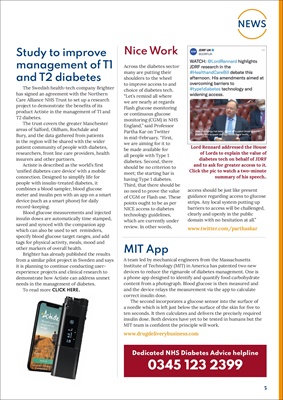
5
NEWS
Study to improve
management of T1
and T2 diabetes
The Swedish health-tech company Brighter
has signed an agreement with the Northern
Care Alliance NHS Trust to set up a research
project to demonstrate the benefits of its
product Actiste in the management of T1 and
T2 diabetes.
The trust covers the greater Manchester
areas of Salford, Oldham, Rochdale and
Bury, and the data gathered from patients
in the region will be shared with the wider
patient community of people with diabetes,
researchers, front line care providers, health
insurers and other partners.
Actiste is described as the world's first
'unified diabetes care device' with a mobile
connection. Designed to simplify life for
people with insulin-treated diabetes, it
combines a blood sampler, blood glucose
meter and insulin pen with an app on a smart
device (such as a smart phone) for daily
record-keeping.
Blood glucose measurements and injected
insulin doses are automatically time stamped,
saved and synced with the companion app
which can also be used to set reminders,
specify blood glucose target ranges, and add
tags for physical activity, meals, mood and
other markers of overall health.
Brighter has already published the results
from a similar pilot project in Sweden and says
it is planning to continue conducting userexperience
projects and clinical research to
demonstrate how Actiste can address unmet
needs in the management of diabetes.
To read more CLICK HERE.
Nice Work
MIT App
A team led by mechanical engineers from the Massachusetts
Institute of Technology (MIT) in America has patented two new
devices to reduce the rigmarole of diabetes management. One is
a phone app designed to identify and quantify food carbohydrate
content from a photograph. Blood glucose is then measured and
and the device relays the measurement via the app to calculate
correct insulin dose.
The second incorporates a glucose sensor into the surface of
a needle which is left just below the surface of the skin for five to
ten seconds. It then calculates and delivers the precisely required
insulin dose. Both devices have yet to be tested in humans but the
MIT team is confident the principle will work.
www.drugdeliverybusiness.com
Lord Rennard addressed the House
of Lords to explain the value of
diabetes tech on behalf of JDRF
and to ask for greater access to it.
Click the pic to watch a two-minute
summary of his speech..
Across the diabetes sector
many are putting their
shoulders to the wheel
to improve access to and
choice of diabetes tech.
"Let's remind all where
we are nearly at regards
Flash glucose monitoring
or continuous glucose
monitoring (CGM) in NHS
England," said Professor
Partha Kar on Twitter
in mid-February. "First,
we are aiming for it to
be made available for
all people with Type 1
diabetes. Second, there
should be no criterion to
meet; the starting bar is
having Type 1 diabetes.
Third, that there should be
no need to prove the value
of CGM or Flash use. These
points ought to be as per
NICE access to diabetes
technology guidelines,
which are currently under
review. In other words,
access should be just like present
guidance regarding access to glucose
strips. Any local system putting up
barriers to access will be challenged,
clearly and openly in the public
domain with no hesitation at all."
www.twitter.com/parthaskar
Dedicated NHS Diabetes Advice helpline
0345 123 2399